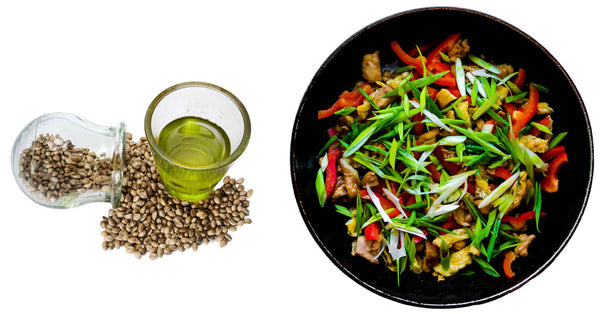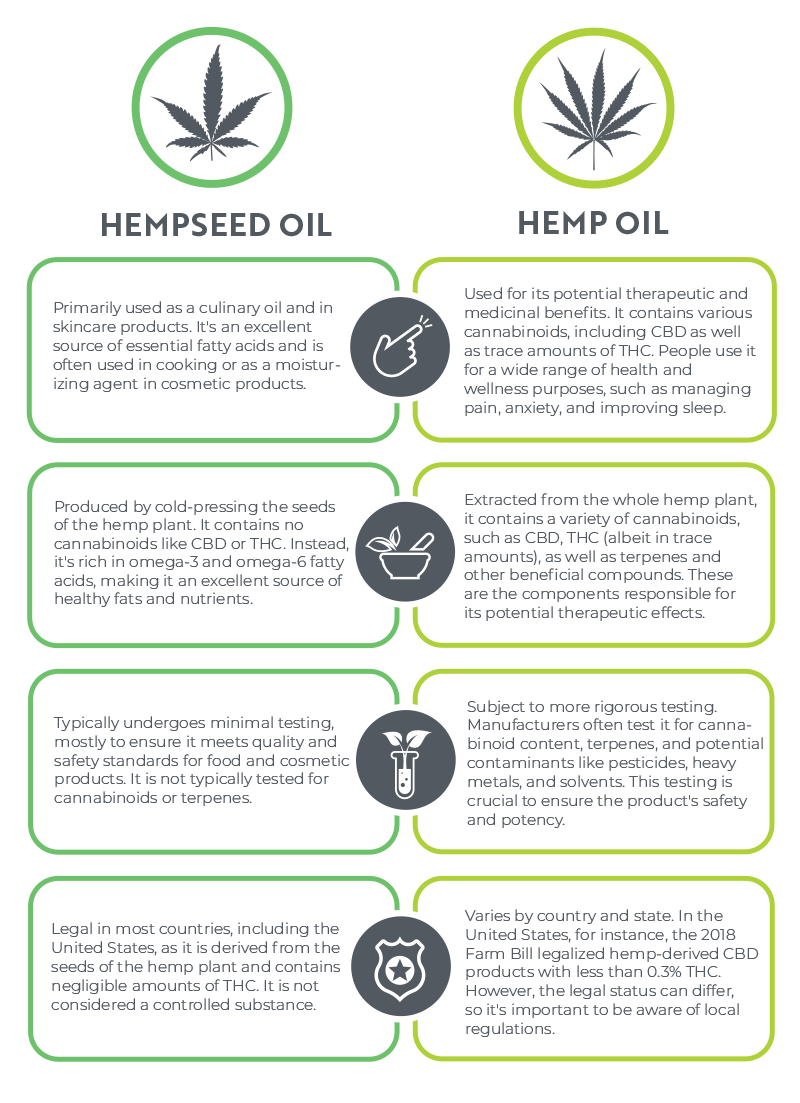Hemp Seed vs Hemp Oil: What do we want from our oil?
Fact: It’s possible to shovel snow with a rake or row a boat with a shovel. However, in doing so, one has to wonder if the best tool for the job was seriously considered. Using hempseed oil for pain relief instead of hemp oil is akin to that line of neglect. Conversely, one happens to be in the kitchen looking to make some blueberry muffins or whip up a fancy stir fry — it is best to reach for the hempseed oil and leave the hemp oil in the medicine cabinet.
These oils may seem similar, but hempseed oil and hemp oil serve very different purposes. They have distinct compositions and come from different parts of the hemp plant. Hempseed oil is made from the stalks and stems of the plant. Its primary use is in food products and is absent of any healing cannabinoids like CBD, THC, or CBN.
On the other hand, hemp oil (or CBD oil) contains cannabinoids that are found in the plant’s flower. CBD oil’s primary use is for medicinal purposes, like relieving anxiety or easing pain. When comparing products containing hemp, it’s essential to consider the differences between hempseed oil and hemp oil (CBD oil).
What you intend on using a hemp product for makes a big difference in whether you should choose products made with hempseed oil or hemp oil.
For example, let’s say you’re in the market for a pain relief product. You’d like to ease some joint pain that’s been bothering you. Curious about all the hoopla surrounding hemp and CBD, you’d decide to give a balm made with hemp a try. After a little online browsing, you quickly discover some considerable price differences between balms. A quick search on Amazon reveals dozens of hemp balms for about $20 bucks. Do another search, this time just on websites of reputable CBD companies. You’ll find that hemp balms are typically priced north of $60 dollars.
Why the huge price difference? It has to do with the ingredients. In particular, the kind of hemp extract used in the product. Hempseed oil is inexpensive. Hemp oil is not. As of this writing, hemp oil products (CBD) cannot be sold on Amazon. Only hempseed oil products. Remember, hempseed oil is made from the stalks and stems of the plant and it’s primary use is in food products. Hempseed oil contains no healing cannabinoids like CBD, and THC. That’s why these hemp balms made from hempseed are much less expensive than balms made from hemp oil. In our example, lower price points can be alluring on the surface. But for what it’s worth, I wouldn’t want to shovel snow with a rake.
If you’re new to searching for products made with hemp oil (CBD oil), it’s easy to be misled. You could end up with a product made with hempseed oil instead of the CBD oil you wanted. Here’s how that tends to happen; read this, and it won’t happen to you.
The confusion stems from how the word hemp is displayed on product packaging. Unfortunately, some companies approach the labeling of hemp packaging like a coconut shell game. Metaphorically speaking, “HEMP” is the coconut shell we can all easily see. Now, think of the word “hempseed” as the object to be hidden under the shell. In this game, the odds of quickly finding hempseed are not in the corner of the uniformed consumer. You have to hunt for it. In contrast to the significant attention-grabbing headline reading: “HEMP,” “made with hemp seed oil,” is usually modestly displayed in unassuming little text intended to be overlooked.
In a nutshell (coconut or otherwise), hemp oil is valued for its potential health benefits, particularly the presence of CBD. In contrast, hempseed oil is appreciated for its nutritional content and culinary applications. When choosing a hemp product, it's essential to understand its source ingredients and intended purpose. Hempseed oil is your go-to for nutrition and culinary adventures, while hemp oil (CBD oil) could be your new wellness partner. Choosing between them depends on your goals. Now that we know the difference, let’s take a look at both of them in a bit more detail.

Hemp Seed oil: a nutrient-rich culinary favorite.
Hempseed oil is prized for its nutritional value. It provides a healthy balance of essential fatty acids and can support heart health, promote skin health, and deliver vital nutrients to the body. Hempseed oil, as the name implies, is made from hemp seeds. Think of it as a nutritional powerhouse. It contains omega-3 and omega-6 fatty acids, vitamins, and minerals. This makes hempseed oil an excellent choice for heart health and overall well-being. You could call it the hemp plant's version of olive oil. So, when you're pouring oil on your salad, chances are good it’s hemp seed oil. Hempseed oil has a mild, nutty taste; in addition to drizzling on salads, it can be blended into smoothies or used as a cooking oil. Hemp seeds, hemp seed oil, and hemp milk (made from hemp seeds) are all rich in nutrients and fatty acids and great for adding to food and skincare.

Hemps legal status
Long before I was hip to hemp, there were times I became a bit perplexed about the legalities surrounding this mysterious plant. The confusion would start at the local supermarket. I’d be searching the health and beauty aisle for a skin moisturizer. I’d scan the shelve and compare various lotions available. They all looked about the same to me except for one container that sported a big ole pot leaf logo on the package. Under the pot logo, huge bold letters read “HEMP.” Then I proceeded to steer my shopping cart toward the cereal aisle, and the same bold letters jumped off the shelf for the second time. This time, “HEMP” graced the face of a cereal box stuffed with granola. I thought to myself, isn’t hemp another word for weed? What’s weed doing in lotions and granola? Then it clicked: those products on the aisle were made with hempseed oil, widely available in beauty and food products because it does not contain cannabinoids like CBD and THC. The legality of hempseed oil has always been straightforward.




